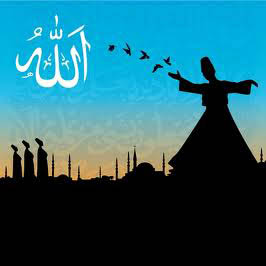 Sufism, tasawwuf, is a way of life.
Sufism, tasawwuf, is a way of life.
Through this way of life, a deeper identity is discovered and comes into being. This deeper identity, beyond the already known personality, is in harmony with everything that exists in the universe. This deeper identity, or the essential self, has abilities of awareness, action, creativity and love that are far beyond the abilities of the superficial personality.
Sufism is a living teaching. Its source is Allah, but the vehicle through which it is transmitted is human, and this transmission has been the work of many dedicated and enlightened teachers throughout history. It is important to remember that as a living teaching, Sufism can be internalized only through experience, and through spiritual work in our daily lives.
 Sufism is a tradition of enlightenment that carries the haqiqah (essential truth) forward through time. This tradition, however, has to be understood in a vital, dynamic sense. Its expression is not limited to the religious and cultural forms of the past. The truth of Sufism requires fresh expression in every age. In all these expressions, Sufism will always be a challenge to an overly materialistic society. It is, and will remain, a critic of too much “worldliness”, of everything that causes us to ignore and to forget the Divine reality. Sufism is, and will remain, a way out of the labyrinth of a secularist, commercial culture. In this sense, Sufism is a direct invitation to meaningfulness and well-being.
Sufism is a tradition of enlightenment that carries the haqiqah (essential truth) forward through time. This tradition, however, has to be understood in a vital, dynamic sense. Its expression is not limited to the religious and cultural forms of the past. The truth of Sufism requires fresh expression in every age. In all these expressions, Sufism will always be a challenge to an overly materialistic society. It is, and will remain, a critic of too much “worldliness”, of everything that causes us to ignore and to forget the Divine reality. Sufism is, and will remain, a way out of the labyrinth of a secularist, commercial culture. In this sense, Sufism is a direct invitation to meaningfulness and well-being.
Sufism, as we know it, developed within the cultural matrix of Islam. The Islamic revelation presented itself as the expression of the essential message brought to humanity by the prophets of all ages. The Qur’an recognizes the validity of 120,000 prophets or messengers who have come to awaken us from our selfish egoism and to remind us of our essential spiritual nature. The Qur’an confirmed the validity of past revelations, while asserting that the original message was often distorted over the course of time.
Historically, Sufism was not conceived separately from the essence of Islam. The true teachers of Sufism have all traced their enlightenment through a chain of transmission going back to Hz. Muhammad (saws). While they may have disagreed with certain interpretations of Islam, they never questioned the essential validity of the Qur’anic revelation; nor were they fundamentalists in the sense of rigidly interpreting that revelation or discrediting other faiths. Most often, they represented the highest achievements within Islamic culture and were a force of tolerance and moderation.
Beginning from its roots at the time of Hz. Muhammad (saws), Sufism has organically grown like a tree with many branches. These branches have been called the tariqahs (the paths). The cause of the branching has usually been the appearance of an enlightened teacher whose methods and contributions to the teaching have been enough to initiate a new line of growth. These tariqahs generally do not see each other as rivals.
 If Sufism recognizes one central truth, it is the unity of being; we are not separate from the Divine. The unity of being is a truth which our age is in an excellent position to appreciate emotionally, because of the shrinking of our world through new media, communications and transportation; and also intellectually, because of the developments in modern science. We are One: one people, one ecology, one universe, one being. If there is a single truth, it is that we are all integral to the One, not separate. The realization of this truth has its effects on our sense of who we are, on our relationships to others and to all aspects of life. Sufism is about realizing the current of love that runs through human life, through the unity behind forms.
If Sufism recognizes one central truth, it is the unity of being; we are not separate from the Divine. The unity of being is a truth which our age is in an excellent position to appreciate emotionally, because of the shrinking of our world through new media, communications and transportation; and also intellectually, because of the developments in modern science. We are One: one people, one ecology, one universe, one being. If there is a single truth, it is that we are all integral to the One, not separate. The realization of this truth has its effects on our sense of who we are, on our relationships to others and to all aspects of life. Sufism is about realizing the current of love that runs through human life, through the unity behind forms.
